Pro Prep Coaching
Genetics
Hard work beats talent when talent doesn’t work hard. When it comes to bodybuilding though, genetics matter….they really matter. I don’t care how hard you work, sometimes you just overcome your genetic limitations in the sport of bodybuilding. What exactly are good genetics though and why do people have a hard time getting their heads around the genetics in bodybuilding?
In nature having good genetics means an organism is perfectly suited to its environment and as a result can pass on its genes to the next generation. When we say someone has good genetics in bodybuilding, we usually mean they have some trait(s) that give them an advantage over their peers that will be rewarded by judges. Just like in nature bodybuilding favours certain characteristics to be successful. In this way, it’s no different to other sports like basketball that favours taller players, or horse racing/gymnastics which selects for small athletes, or strongman where the largest athletes prevail.
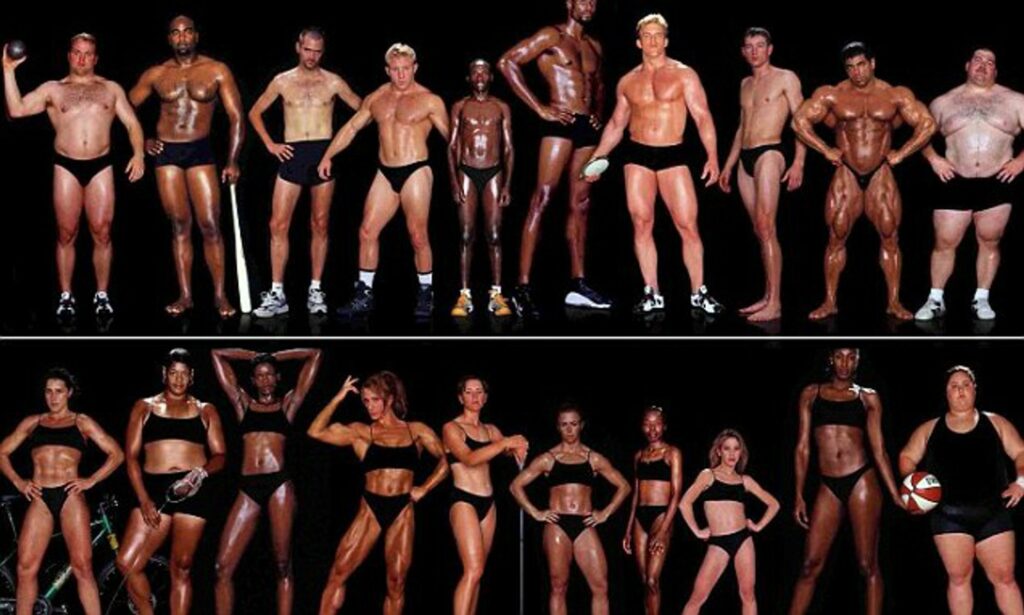
How Do Genetics Work And What Are Genes?
No discussion of genetics would be complete without first discussing genes and the importance of the environment. At the cellular level DNA is the building blocks which contain the blueprint for life. These blueprints are called genes. Genes encode for amino acid sequences that when combined make proteins. When we say environmental factors, we mean both the external environment to the cell within the body, and the environment out with the body. For example, if your body detects an increase in blood sugar levels then genes encoding for the protein insulin are expressed in the pancreas, while genes which are responsible for the proteins that created GLUT4 transporters in muscle cells are expressed. In this way you can see that genes are expressed both in terms of the internal and external environment. Another example is where a training stress is placed on a muscle, this sends a signal to the cell nucleus where your DNA is stored, and a gene is expressed which tells the cell to start making more protein leading to a larger muscle cell. If you engage in cardiovascular activity a different signal is sent to the cell which leads to the cell expressing different genes that encode for more mitochondria which allow the cell to generate more energy during aerobic activity. There are over 22,000 individual genes within the human body of which there are different flavours which may be more or less effective at producing a particular protein, which in turn we call talent. The some of an individuals genes are inherited from your parents. So if both your parents were championship bodybuilders there’s a high probability you’ll have inherited some combination of genes that give you an advantage for muscle building over the general population.
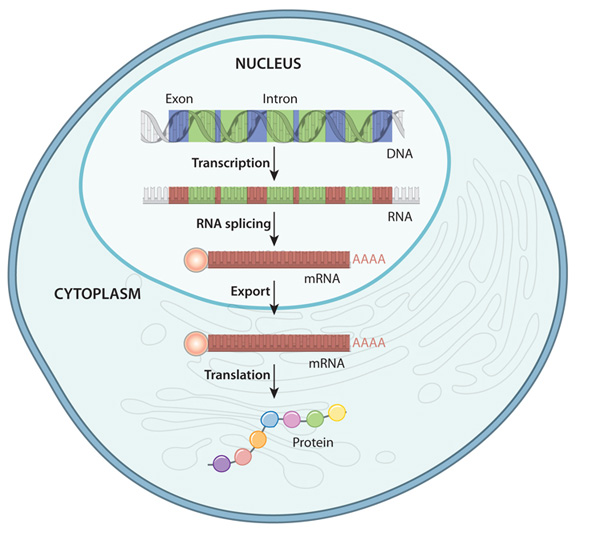
Nature vs Nurture
The key here is that for the gene to be expressed, there needs to be environmental stimulus. It’s always a combination of nature and nurture. So, someone can possess a great set of genes, but unless they are subject to the correct environment those genes will never be expressed. So you can have great genes to build muscle, but unless you pick up a barbell or do a manual job, don’t expect to be muscular. Single genes also don’t tend to matter as much as you might think. Ever heard of the sprinter gene ACN3 for example? (click here to read about the ACN3 gene) If you have it then you’re more likely to be better at producing strength and power. However, it takes combination of 100s of genes to contribute to a physical trait or in some cases like someone’s height it could take 1000s. Having the ACN3 gene might confer a 0.5% advantage, but then again you might possess half a dozen genes that reduce your ability to build and strength and power by 0.1% each. Remember there are 22,000 genes it’s not a single gene game and we’ve yet to identify what all these individual genes do. This is where individuality comes in, and certain combinations of genes, combined with different environmental stressors can yield vastly different results. Someone of Afro-Caribbean decent might for example have what it takes to be a great sprinter, but unless the talent is nurtured in the right environmental conditions, they might have trouble running to catch a bus. There is of course a baseline which we all work from otherwise things like medicine wouldn’t work, however it does explain things like why your friend might be lactose intolerant, but the rest of their family isn’t, or why two friends starting the gym at the same time doing the same program can end up with vastly different results.
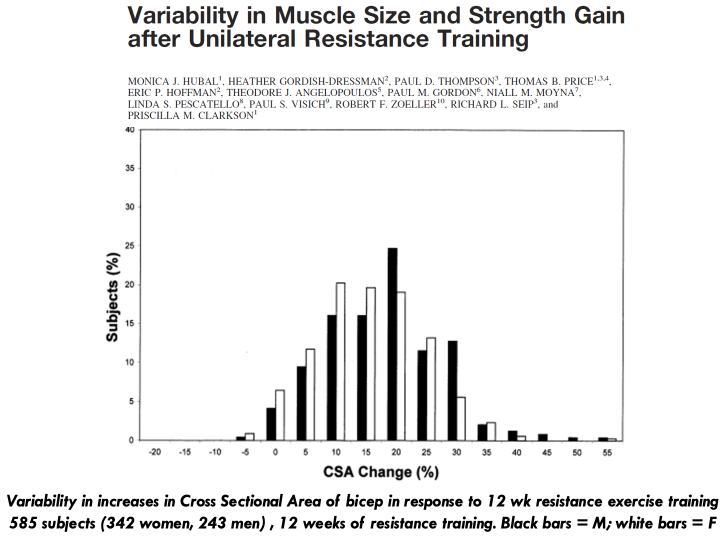
The Bell Curve Matters
Lots of human traits follow the classic bell curve pattern. In the example above you can see response to exercise training is no different. Some people will obtain fantastic results from a training program. However most people (68% to be exact), will cluster around the mean and median and obtain more modest results, in this case between 10 to 25 % increases in muscle mass from a 12 week bicep training program. In more extreme cases or at the tails, 16% could be characterised as being low and high responders. If you want to break it down even more at the extreme end of the tails, the high responders (0.1% to 1%) increased their muscle mass by up to 55%, do the math and you realise thats around 2 people from 585. These people are likely to have what it takes to be champions the others in the top 16% will also likely be able to go on and have promising careers as bodybuilders, those who fall within the middle 68% can expect to have more modest bodybuilding careers.
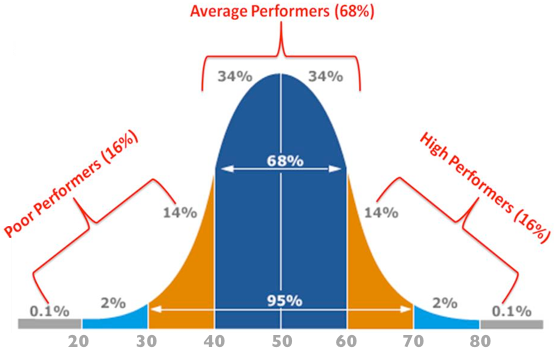
Should I Get My Genes Tested?
Lots of companies offer you the ability to test your genes. I’ve done it myself. The problem as mentioned above however is that having a specific gene needn’t necessarily mean it manifests in a particular trait. As well as having the genes, your body also employs regions of DNA called Exons and Introns, which act to increase or decrease the expression of genes, there’s also another layer that we call epigenetics and imprinting which perform a similar function. Epigenetic imprinting can completely silence the expression of a gene making it’s function null and void. The complicated nature of genes therefore means any genetic testing you have performed is usually only ever correlative. E.g. having one particular gene might mean you express one particular trait or another. Some genes are more researched than others, but even where they are, it’s difficult to quantify in most cases how much of a difference this might make. The FTO gene for example, which is noted to be associated with obesity, might lead to a 1% greater increase of becoming obese over a lifetime, which really seems neither here or there, in an individual dedicated to a health and fitness lifestyle or from a higher socioeconomic status where social standing is known to make a large contribution to body mass index. If I use myself as an example for a second the DNA test I had performed suggested from 41 traits that amongst other things I disliked coriander, that I’m more likely to be extroverted, that I was less likely to suffer from male pattern baldness, I’m likely to be good at remembering my dreams and that I was likely risk averse. In reality, I don’t really mind coriander, I’m probably more extroverted, I have a good hairline, I can’t say I’ve ever been very good at remember my dreams and I’m probably fairly average if not slightly above average when it comes to risk taking. For those keeping score, you could probably done just as well with a coin flip. Genetic testing is cool, but don’t expect a gene specific diet or training program to confer any real world advantage over more general fitness or healthy eating advice, not at this point anyway. This is just one of the reasons why the Scientific Advisory Committee for Nutrition’s current position stance doesn’t support genetic testing.
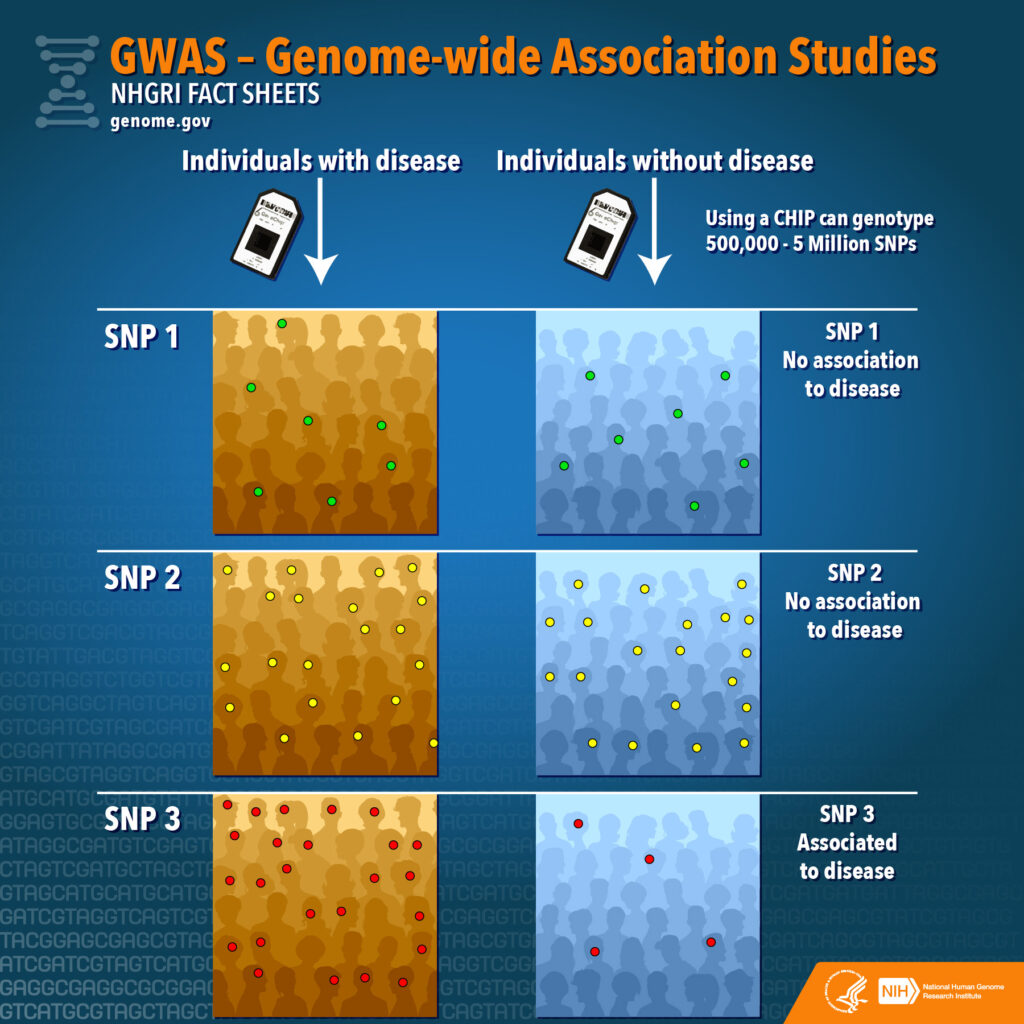
What Genes Are Good For Bodybuilding?
Well there are lots of traits that can be advantageous for bodybuilding. By virtue of the fact someone has decided to compete though it probably means they possess many of the advantageous traits compared to the average person. Provided an individual is otherwise healthy with no underlying health conditions here are some phenotypical traits which I would consider as important for bodybuilding so count yourself lucky if you have some of these. As an aside, it’s rare you see people with all these traits. A good competitor might have 5, 6 or 7 out of the 10, but it’s only the truly special athletes who are 10 out of 10s.
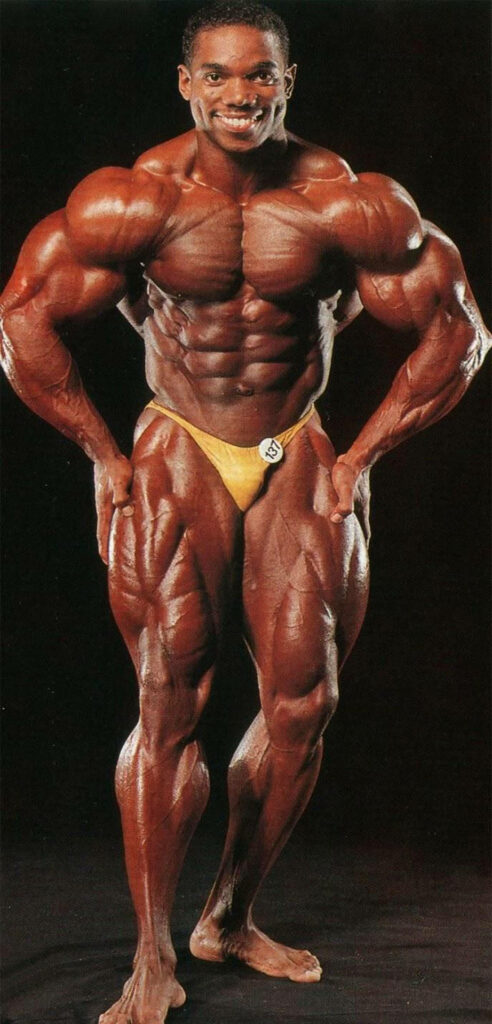
Advantageous Genetic Traits For Bodybuilding
Below is a list of traits advantageous for bodybuilding alongside an assessment of my own potential for these traits.
- The Ability to Build Muscle
- I’m above average here, probably in the top 15 to 20% of individuals, I’m a 7 out of 10
- The Ability to Lose Weight Quickly While Preserving Muscle
- Losing fat and preserving muscle has never been an issue for me some are better at this than me but I’m not too shabby, probably 7/8 out of 10
- High Recovery Capacity
- When I was younger I was always capable of producing a high amount of work and recovering, again probably a 7/8 out of 10
- Great Skin
- I have good skin, I have no issues with allergies and tanning has never been an issue, 7/8 out of 10.
- The Perfect Skeleton
- My shoulders are broad and my limb lengths in proportion which support a lot of muscle, however my hips are wide, 6/7 out of 10
- Body Mechanics for Movements
- My limb lengths and proportions are even making my performance in the big compound lifts uniform, 7/8 out of 10
- Great Muscle Insertions, e.g round muscle bellies, with insertions and origins close to the end of the limb
- My arms and legs are great in terms of insertions, but I could have better calves, and back insertions. So some muscles could be rounder, but it’s not all bad, probably a 7 out of 10.
- Great Muscle Detail, Striations etc
- I have good detail in my arms, chest, abs and back, but I never really have crazy detail in my legs or glutes. It’s not for a lack of trying, 7 out of 10
- Resilient Joints, or Injury Resilience
- Some of my joints are better than others, I’m probably pretty average here, 6 out of 10.
- A High Pain Threshold
- When I was younger I did some crazy things in the gym. I had good pain tolerance but I never considered myself above the norm with my peers, 7/10
- Stress Management/ Mental Resilience
- If there’s one thing I think I do better than most it would be this. I’m just better at compartmentalising and switching off compared to others, 8/9 out of 10.
Combine these traits with a personality (that’s also considered to be between 30 to 75% genetic) that’s emotionally stable and conscientious and you’ll have a very good bodybuilder. I’ve seen some great bodybuilders in my life, I don’t know if I’ve ever truly encountered a bodybuilder that had all these 10 things, the shape of the muscle and the skeleton is often where a lot of bodybuilders come unstuck.

Coming To Terms With Your Own Genes
A lot of people who come into competitive bodybuilding having been successful athletes in the past. They’re competitive people by that very nature. What they tend to struggle with is three things, 1) coming to terms with their own genetic shortcomings; 2) the amount of time required to build a top-level physique; 3) how someone seemingly with a lower skill level/professionalism or work ethic can obtain superior results.
Expectations vs Reality
Expectations
In most sports time spent improving your skill, fitness or tactics gives you a real advantage over your peers, a couple of months working on a skill can manifest in real improvements in your level. Moreover, a lot of sports favour younger athletes and people can be world class between the ages of 19 to 25. This is because a lot of sports favour, strength, power, and endurance all of which are associated with youth. There’s also a lot of transferable skills between sports. You find a lot of multi event athletes in sport. People who given the time are good at lots of sports. For example, they can usually if they play racket sports pick up another one, or do multiple athletic/throwing or team sports.
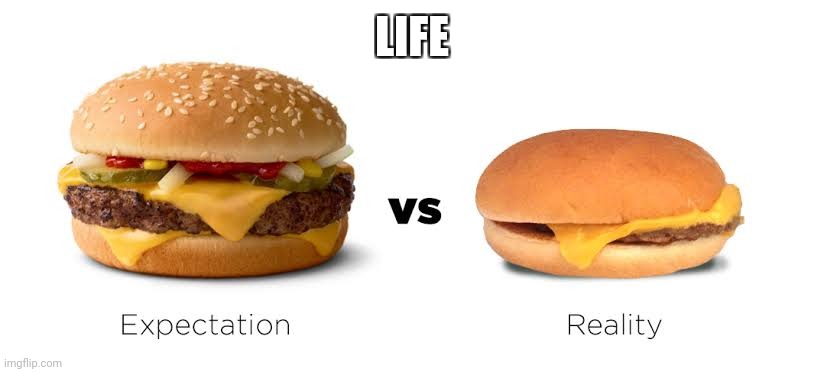
Reality
Bodybuilding is different. A power and strength sporting background helps since these sports single out those athletes that were more muscular however bodybuilding favours the older athlete. it’s not unusual for a guy in their 30s or 40s to win the class at a national or world finals. Moreover, you can work hard on your training form, posing, and dietary regime, but the payoff can take years rather than months this makes the barrier to entry high. It’s not like Sunday league touch rugby where you might be good to play in a couple of weeks. Furthermore, you can do everything right and by the book, but unless you have the correct genetics you may always struggle to climb the ladder in competitive bodybuilding. That doesn’t mean that you can’t get better and be the best version of you, but it does mean you may have to be more realistic about what you can achieve. Just like other sports you also get extremely talented individuals who just seem to have it with very little experience or time lifting they can just build muscle and grow like a weed. This is the thing successful people can have the hardest time coming to terms with. It’s also one of the reasons why the average trainer seems to accuse everyone of taking steroids. Since someone elses gains far exceeds their own, and seemingly with half the amount of effort.
Genetic Privilege
“Comparison is the thief of joy” – Theodore Roosevelt. Once you come to term with your own genetic limitations it can help you become less critical of yourself and help you rationalise your progress. Blaming your genetics however shouldn’t be a get out. It is however helpful to appreciate the wide range of human abilities. For example, two people on a diet and one will lose weight at an astounding rate week after week, no problem at all, while the other might have to struggle for every lb of fat loss. You can see this illustrated perfectly in the example below from training studies looking at how some people build huge amounts of muscle and strength following same training program, while others make very little improvement at all.
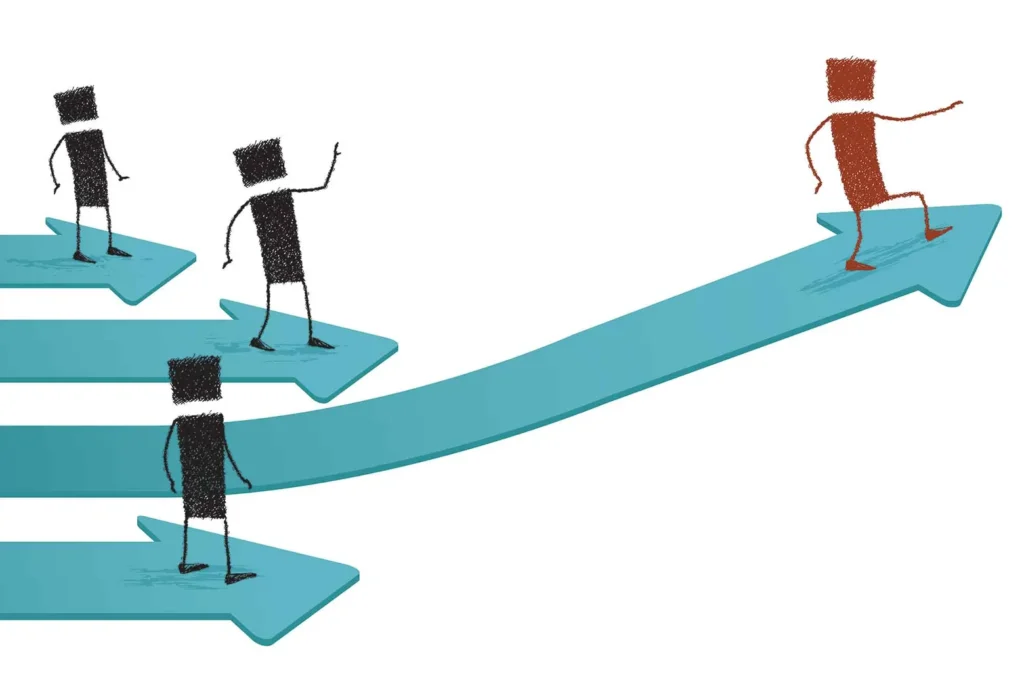
It’s equally important to appreciate if you have good genetics that people are unlikely to find things as easy as yourself, this is a concept that I call “genetic privilege”. I see this a lot from bodybuilders who are inexperienced at coaching or in those who don’t come from a science background. The mantra to just work harder reflects the understand of the range of human possibilities. As athletes these people never struggle to do well, however if they start to work with clients they start to appreciate not everyone finds it so easy.
What Can You Do With This Information?
Well as stated above, your genetics shouldn’t be used as an excuse, but what they can be is useful for is setting expectations and taking the pressure off yourself. For example your muscle shape and limb length is determined by your genetics. You might be able to improve your shoulder to waist ratio by building bigger shoulders and lats, however if your hips are 34 inches compared to one of your peers with a 27 inch set of hips then you need to be realistic. You’re probably never going to have a wasp like waist, but you probably have other strengths like being able to support greater loads on your back and build a larger set of legs. Moreover, provided you’re eating enough energy, have enough protein in your diet, your diet is diverse in fruits and vegetables, allow yourself enough time to recover, you always focus on excellent training technique, you follow a periodised program and you’re implementing progressive overload techniques you’ll progress and build muscle, even if it’s not at the same rate as someone else. It can also help you take the pressure off yourself, that the love of lifting or doing bodybuilding competitions is the real aim rather than relentlessly trying to win if you don’t have the top tier genetics. Remember it’s always you against you and the only person you should be comparing yourself to is yourself. If you’re struggling to make progress and you’re ticking all the boxes above and applying the then it’s time to experiment with different training protocols like higher or lower frequency training for example. However, in my experience a failure to employ the basic principles mentioned above is usually the thing holding people back rather than their genetics and it’s usually bad exercise technique.
Patience Is A Virtue
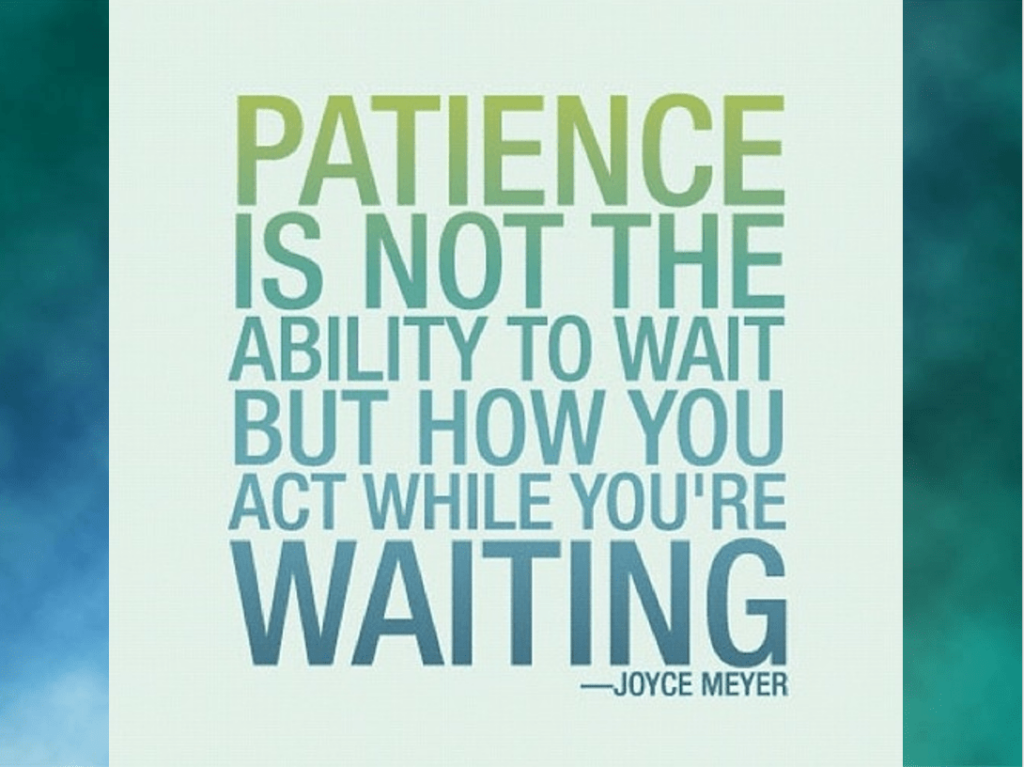
One of the biggest things most trainers would benefit from is learning to have patience. People often get side tracked falling into the bulls***t trap of believing in bogus training programs, fad diets and junk supplements. Time is what really matters when it comes to progress, that and doing the basics mentioned above. So here’s a few pointers with time in mind: a training program should last for a minimum of 6 to 8 weeks, periods of anabolism/bulking should last for at least 20 weeks; cutting programs should last at a minimum 12 to 16 weeks. If you want to get really ripped diet for even longer. If you want to get bodybuilder muscular and lean think in terms of 3 year blocks, I’m talking 6 to 9 years, If you want to be a British champion start thinking 10 years of training and read my article on how long It takes to be a professional bodybuilder (click here). Finally if you want to make sure you’re getting the right advice and want to make sure you’re not wasting time going down the wrong path then work with a Pro. As always if you think we can help you then hit that sign up today Click Here.
